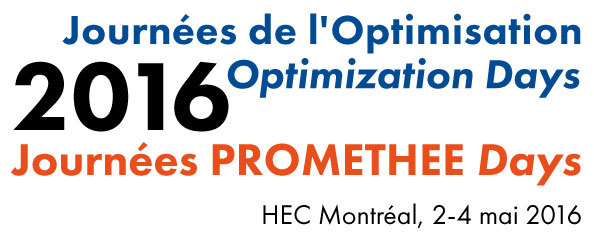
Journées de l'optimisation 2016
HEC Montréal, Québec, Canada, 2 — 4 mai 2016

WA4 Learning and Optimization Problems for Homecare Services
4 mai 2016 10h30 – 12h10
Salle: Gérard-Parizeau
Présidée par Louis-Martin Rousseau
4 présentations
-
 10h30 - 10h55
10h30 - 10h55An ALNS to solve the time-dependent home health care problem
Due to the increasing number of elderly, optimization of health resources becomes primordial. In our problem we study the Home Health Care problem and we implement a method using ALNS (Adaptative Large Neighborhood Search). This study, in collaboration with the AlayaCare company, attempts to take into account all business constraints such as: the time window for patients and nurses, time-dependent travel times or patient preferences.
-
 10h55 - 11h20
10h55 - 11h20Maxout networks to predict homecare patients hospital readmissions
We use maxout neural networks to predict when a patient is heading toward a hospital readmission early enough for care workers to take action and try to prevent it. Our results show that maxout networks are a promising alternative to manually engineered alerts based on vital sign thresholds.
-
 11h20 - 11h45
11h20 - 11h45Data-driven ALNS-based algorithm for home care routing problem
With the rise of the big data era, more information is available thus allowing to model precisely the reality. In home care delivery services, nurses roads need to be updated at least once a day to take into account any events such as new patients arrival or emergency patient visits. We propose a dynamic ALNS-based algorithm to adapt the current schedule to changes. The data-driven procedure will be detailed in this presentation.
-
 11h45 - 12h10
11h45 - 12h10Two new history-based delay predictors for call centers
We propose two predictors to estimate the delay of customers in call centers. The first method predicts the delay by extrapolating the wait history of customers currently in queue. The second predictor uses an exponential smoothing of the delays of past customers conditional to the queue length.
